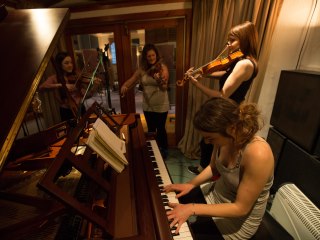

Scottish powerhouse quartet Fara are about to unveil a third studio album fuelled by their native Orkney’s revolutionary role in renewable energy.
Fusing the talents of three fine Orcadian fiddlers and vocalists - Jeana Leslie, Catriona Price and Kristan Harvey - alongside stand-out Highland pianist and newest member Rory Matheson, Fara have firmly secured their foothold at the forefront of the Scottish folk scene. The unexpected result of a one-off concert at 2014’s Orkney Folk Festival Fara quickly made their mark, weaving increasingly sophisticated threads in their rich sonic skein.
Shortlisted in 2015’s Scots Trad Music Awards for Up and Coming Act of the Year, Fara performed a triumphant set at the 2017 BBC Radio 2 Folk Awards at the Albert Hall as Horizon Award nominees and have gone on to win a German Critics’ Choice Award and a Live Act of the Year nomination at 2019’s Scots Trad Music Awards. Their Orkney homeland is intrinsic to their music. Says Jeana: “Orkney has so many faces - the colours, sounds, light and water are always changing”. Catriona agrees: “I’m still floored by the landscape every time I’m there.”
Their feisty, multi-awarding sound is now encapsulated in the sweeping, passionate 12-track Energy Islands – inspired by Orkney’s pioneering role in renewable energy. Says Catriona: “Having been born and raised among the breathtaking natural beauty of Orkney we wanted to highlight its role in raising awareness and curbing the climate crisis.”
Incredibly a technical revolution - and an abundance of wind and water in an archipelago of islands closer to the Arctic Circle than London - means the people of Orkney now produce more energy than the National Grid can take. Harnessing that coveted green energy through tides, waves and wind is something that struck Fara as akin to their music. Says Catriona: “To us this feels like a physical manifestation of the energy that traditional music brings to our communities. As Laura Watts wrote in her book Energy at the End of the World: “Feel the Energy Islands with all your senses.”
Read more about Orkney’s northern powerhouse!
Taking their name from an islet in Scapa Flow, Fara certainly evoke that energy in this new 12-track album that leads on from impressive debut CD Cross the Line and the acclaimed sophomore album Times From Times Fall.
Those albums owed more to traditional Scottish folk music but Energy Islands brings something of a new dawn – showcasing a bounty of collaborative original instrumentals and songs with intricate and inventive arrangements. Mixed by Iain Hutchison and mastered by Nick Cooke, the album was recorded by Euan Burton at GloWorm Recording Studios in the band’s adoptive home of Glasgow. It is produced by Fara alongside Seonaid Aitken who also contributes additional fiddle on one track and vocals on the title track.
Despite Orkney’s reputation for wind and storm, album opener Solar salutes the sunshine that can also embrace the islands and the summer solstice. It starts with plucked strings and swiftly builds into a full-blooded, all-hands-on-deck fast and furious feelgood opener pairing Harvey’s Sunkiss with Matheson’s The Witch o’ Summerdale and Leslie’s The Battle o’ Summerdale (Summerdale is the site of the last pitched battle ever fought on Orcadian soil in 1529). Wind Dancers starts subtly with percussive bowed fiddle and another fiddle line dancing around it and builds speed, like the spinning sails of Orkney’s prolific wind turbines. The aural tapestry broadens into a strong, strident, frenetic sound with Matheson’s engaging keys weaving beautifully through the fiddles. The title of the tune set comes from a verse in Orcadian writer George Mackay Brown’s poem Fiddlers at the Harvest and the first tune, Chinook Winds was penned by Leslie in 2021 for the St Magnus Festival which marked the writer’s centenary – it’s inspired by the warm ripening wind blowing through the corn at harvest time.
The second tune, Turbine Down is dedicated to all the domestic wind turbine owners in Orkney – the islands are festooned with turbines generating emission-free power for local villages. The windy theme continues on Fair Winds, the first song on the album, written by Leslie who takes the lead vocal. It’s an exhilarating, spinning-free number which was written after Leslie and Harvey climbed Stromness’s ‘Brinkie’s Brae’ - one of Orkney’s finest viewpoints – as part of their lockdown project ‘The Orkney Series’. They explored the story of Bessie Millie, a 19th century ‘weather witch’ who made her living selling ‘favourable winds’ to sailors– perhaps the town’s first renewables entrepreneur! She became the inspiration for one of the characters in Sir Walter Scott’s book The Pirate, written during his stay in Orkney.
Merry Dancers is a slower, haunting, ethereal song arranged around Lucy Dougall’s poem from the book ‘Orkney Days’ and Leslie and Price’s music depicts the mystique of the Northern Lights which can often be seen from Orkney. Matheson’s sublime piano ripples throughout. That sensitive piano continues in the tranquil and more traditional sounding Song in the Night beautifully adapted from the poem by Duncan J. Robertson which explores the contrast between the ‘nameless terror’ of the night and the salvation and calm of dawn and daylight.
The final song on the album is the plaintive, fragile and affecting Northerner. Catriona Price’s emotive music decorates the words of Margaret Tait, a prolific Orkney-born film maker and poet and a trailblazer for women in the arts. Says Price: “Northerner speaks of the extremes in light and dark we experience in the Northern Isles- and waiting for the healing sun.”
Back to the tunes and it’s Matheson’s turn to provide part of the Broom Power set. BroomPower is a community hydro scheme near Lock Broom, south of Ullapool, which began generating electricity in 2017. The water source used to supply the hydro is Matheson’s inspiration here, for the tune Allt a’Mhuillnn – Burn of the Mill. Paired with that is Leslie’s Orbital O2 inspired by the Orkney-based Orbital Marine Power’s O2 device - set to become one of the world’s most powerful tidal energy sources. Percussive and upbeat it dances and jazzily trips along, the relaxed fiddles weaving around Matheson’s sprightly tune. The fiddles gradually become more dominant, encircling the keys and growing ever wilder and bolder through Orbital O2 in a wholly expressive track.

The Hampshire, with plaintive piano and mournful violin is a solemn, measured number recalling how in 1916 HMS Hampshire set sail from Orkney’s naval base at Scapa Flow on her way to Russia. Weather conditions were treacherous and striking a mine at Marwick Head, 737 lives were lost including Secretary of State for War Lord Kitchener. The Kitchener Memorial was erected there in 1926 and to mark the centenary Kristan Harvey was commissioned to write this special piece of music, with Seonaid Aitken’s lovely string arrangement.
West Tide Story pairs Matheson’s The Bermuda with Price’s Rudha Beag - both tunes inspired by the North West of Scotland; Price‘s grandmother’s house was named Rudha Beag and situated just outside Ullapool close to where Matheson grew up. It recalls the cruise liner built to ferry passengers between Bermuda and New York – following a fire it was declared only good for scrapping but en route to the scrapyard The Bermuda broke free and parts of the wreckage can still be found on the shores of Duarte Drumbeg. The chameleon, quick-change qualities of Fara are to the fore in this number. Starting with undulating fiddle and piano notes it builds into a big stately number that starts sounding classical and morphs into something brilliantly jaunty and jazzy, such is the versatility of this quartet.
The White Horse Power set starts in steady traditional tune vein and swirls into a dancing, ceilidh-like melody – all in celebration of Orkney’s waves – one of the islands’ greatest assets in meeting its renewable energy goals. The last tune in the set is dedicated to Catriona’s own real-life childhood white horse Silver, whose Sunday name was Quicksilver! The album heads to its close with the Excess Electric set – a celebration of Orkney’s energy excellence but posing the question as to what can be done with the excess energy that the islands have created but the National Grid cannot take. The fiddles start to race, maybe thinking of all the innovative ways this excess energy can be harnessed- it builds to a confident crescendo of joy and ends with notes hanging in the air like a question mark.
The title track completes the album in style. From its raindrop-like pizzicato opening and subtle piano it moves into an initially pensive, slightly melancholic fiddle refrain that wraps itself like a cloak around this captivating number, before escalating into much more – an epic, cinematic tune full of the pride these gifted musicians feel for their forward-looking homeland.
Soaring and elemental Energy Islands is a release about a group of islands whose grand green vision has already come true, stamped with Fara’s own high energy compositions. Says Catriona: “We hope this album will encourage our fans to look more deeply at what can be done to put the brakes on climate change in this incredibly fragile planet.” Energy Islands, released August 26, is supported by Creative Scotland which has also funded a further season of The Orkney Series – the social media video series Fara made during lockdown. New episodes, exploring the themes of each track and visiting the places that inspired the music will be released weekly following the album’s release date.
Photo Credits:
(1)-(3) Fara
(unknown/website).